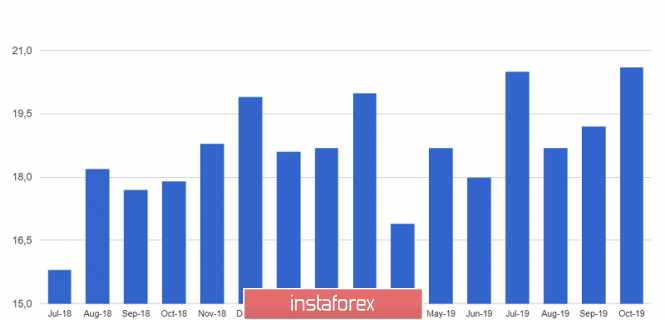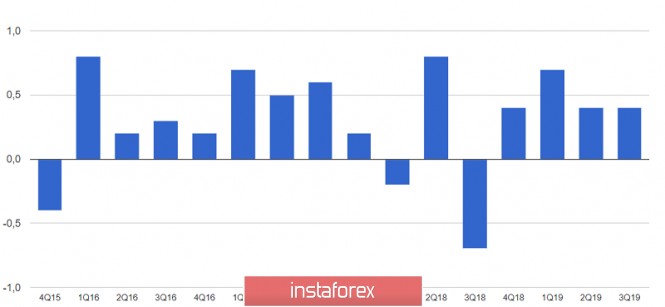The euro slightly strengthened its position against the US dollar, and German export data pleasantly surprised traders and economists, resulting in the likelihood that the country will be able to avoid a recession in the fourth quarter of this year. Positive data on foreign trade can support German economic growth at the end of this year, despite the general slowdown in global GDP.

According to the report of the Federal Bureau of Statistics Destatis, the positive balance of foreign trade of Germany in October 2018 amounted to 20.6 billion euros against 19.2 in September this year. Economists had expected that the surplus would decline further and be at the level of 18.9 billion euros. Exports immediately increased by 1.2% compared to September and amounted to 119.5 billion euros, while imports remained unchanged compared to the previous month at 98.0 billion euros. Economists had forecast a decline in exports in October with a correction of 0.3%, which would lead to a drop in the overall balance.

Given that important fundamental statistics are no longer expected to be released today, all attention will be shifted to central bank meetings scheduled for this week. Most likely, the Federal Reserve will take a break in the cycle of lowering interest rates, especially given the data on the labor market, which were released at the end of last week, which could increase demand for the US dollar. However, more traders are relying on the European Central Bank meeting, at which ECB Chief Christine Lagarde will announce her monetary policy program. Let me remind you that the leaders of the US Fed will hold a meeting on Wednesday, and their colleagues at the ECB on Thursday.
The technical picture of the EURUSD pair remained unchanged compared to the morning forecast. Bulls were unable to show anything today at the resistance level of 1.1070, so only a breakout of this range will increase the demand for risky assets and return the trading instrument to last week's highs in the areas of 1.1115 and 1.1160. If pressure on risky assets continues, a break of support of 1.1040 will lead to a further downward correction to the area of lows 1.1000 and 1.0960.
USDJPY
The Japanese yen continues to be in demand as a safe-haven asset after the US dollar slightly fell late last week. Today's report that the Japanese economy was growing much faster than previously thought also supported the yen. Growth was better due to larger companies.

According to data, in the third quarter of this year, Japan's GDP grew by 1.8% year-on-year, while, according to preliminary estimates, growth was expected to be only 0.2%. However, an increase in company expenses alone was not enough to offset the negative effect of a slowdown in the global economy. Let me remind you that Japan's GDP grew by 2% back in the second quarter of this year. Investment growth increased by 1.8% compared with the previous quarter against growth of 0.9% according to preliminary estimates.
The material has been provided by InstaForex Company - www.instaforex.com